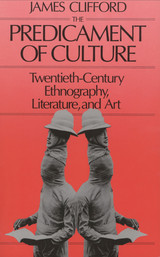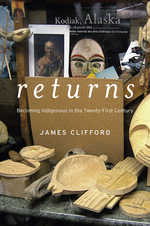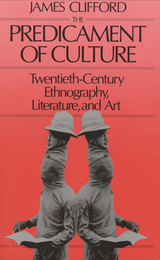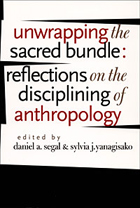

The Predicament of Culture is a critical ethnography of the West in its changing relations with other societies. Analyzing cultural practices such as anthropology, travel writing, collecting, and museum displays of tribal art, James Clifford shows authoritative accounts of other ways of life to be contingent fictions, now actively contested in post-colonial contexts. His critique raises questions of global significance: Who has the authority to speak for any group’s identity and authenticity? What are the essential elements and boundaries of a culture? How do self and “the other” clash in the encounters of ethnography, travel, and modern interethnic relations?
In chapters devoted to the history of anthropology, Clifford discusses the work of Malinowski, Mead, Griaule, Lévi-Strauss, Turner, Geertz, and other influential scholars. He also explores the affinity of ethnography with avant-garde art and writing, recovering a subversive, self-reflexive cultural criticism. The surrealists’ encounters with Paris or New York, the work of Georges Bataille and Michel Leiris in the Collège de Sociologie, and the hybrid constructions of recent tribal artists offer provocative ethnographic examples that challenge familiar notions of difference and identity. In an emerging global modernity, the exotic is unexpectedly nearby, the familiar strangely distanced.

Returns explores homecomings—the ways people recover and renew their roots. Engaging with indigenous histories of survival and transformation, James Clifford opens fundamental questions about where we are going, separately and together, in a globalizing, but not homogenizing, world.
It was once widely assumed that native, or tribal, societies were destined to disappear. Sooner or later, irresistible economic and political forces would complete the work of destruction set in motion by culture contact and colonialism. But many aboriginal groups persist, a reality that complicates familiar narratives of modernization and progress. History, Clifford invites us to observe, is a multidirectional process, and the word “indigenous,” long associated with primitivism and localism, is taking on new, unexpected meanings.
In these probing and evocative essays, native people in California, Alaska, and Oceania are understood to be participants in a still-unfolding process of transformation. This involves ambivalent struggle, acting within and against dominant forms of cultural identity and economic power. Returns to ancestral land, performances of heritage, and maintenance of diasporic ties are strategies for moving forward, ways to articulate what can paradoxically be called “traditional futures.” With inventiveness and pragmatism, often against the odds, indigenous people today are forging original pathways in a tangled, open-ended modernity. The third in a series that includes The Predicament of Culture (1988) and Routes (1997), this volume continues Clifford’s signature exploration of late-twentieth-century intercultural representations, travels, and now returns.

When culture makes itself at home in motion, where does an anthropologist stand? In a follow-up to The Predicament of Culture, one of the defining books for anthropology in the last decade, James Clifford takes the proper measure: a moving picture of a world that doesn't stand still, that reveals itself en route, in the airport lounge and the parking lot as much as in the marketplace and the museum.
In this collage of essays, meditations, poems, and travel reports, Clifford takes travel and its difficult companion, translation, as openings into a complex modernity. He contemplates a world ever more connected yet not homogeneous, a global history proceeding from the fraught legacies of exploration, colonization, capitalist expansion, immigration, labor mobility, and tourism. Ranging from Highland New Guinea to northern California, from Vancouver to London, he probes current approaches to the interpretation and display of non-Western arts and cultures. Wherever people and things cross paths and where institutional forces work to discipline unruly encounters, Clifford's concern is with struggles to displace stereotypes, to recognize divergent histories, to sustain "postcolonial" and "tribal" identities in contexts of domination and globalization.
Travel, diaspora, border crossing, self-location, the making of homes away from home: these are transcultural predicaments for the late twentieth century. The map that might account for them, the history of an entangled modernity, emerges here as an unfinished series of paths and negotiations, leading in many directions while returning again and again to the struggles and arts of cultural encounter, the impossible, inescapable tasks of translation.

The essayists consider the complex state of anthropology, its relation to other disciplines and the public sphere beyond academia, the significance of the convergence of linguistic and cultural anthropology, and whether or not anthropology is the best home for archaeology. While the contributors are not in full agreement with one another, they all critique “official” definitions of anthropology as having a fixed, four-field core. The editors are keenly aware that anthropology is too protean to be remade along the lines of any master plan, and this volume does not offer one. It does open discussions of anthropology’s institutional structure to all possible outcomes, including the refashioning of the discipline as it now exists.
Contributors. James Clifford, Ian Hodder, Rena Lederman, Daniel A. Segal, Michael Silverstein, Sylvia J. Yanagisako
READERS
Browse our collection.
PUBLISHERS
See BiblioVault's publisher services.
STUDENT SERVICES
Files for college accessibility offices.
UChicago Accessibility Resources
home | accessibility | search | about | contact us
BiblioVault ® 2001 - 2024
The University of Chicago Press









